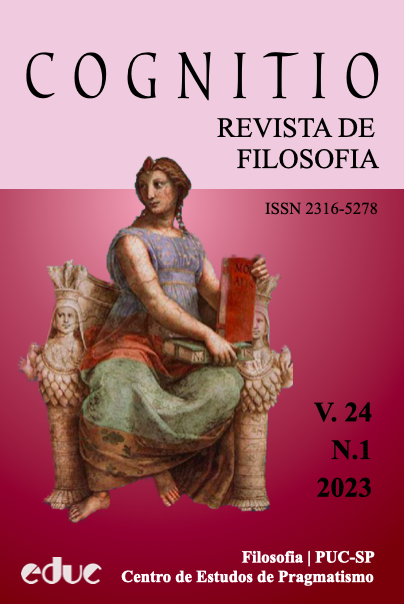Apontamentos para o estudo de comunidade política na hermenêutica de H.-G. Gadamer
DOI:
https://doi.org/10.23925/2316-5278.2023v24i1:e60702Resumo
O presente texto tem como objetivo apontar, a partir de suas obras mais recentes, que na hermenêutica da práxis de Gadamer há elementos suficientes para ser fundamentada uma teoria da comunidade política enquanto espaço propício ao desenvolvimento do engajamento por parte dos cidadãos nos compromissos éticos e políticos no contexto das sociedades democráticas contemporâneas. Apesar de ainda não ser tão explorada pelos teóricos atuais a dimensão política da hermenêutica gadameriana, a originalidade desta pesquisa se dá a partir da análise da possibilidade de existência da comunidade política nas contribuições hermenêutico-filosóficas de Gadamer. Estas conduzem à práxis do engajamento dos cidadãos em seus compromissos frente à real situação em que se encontram as sociedades democráticas, bem como a preocupação com o uso desmedido da ciência e técnica na atualidade, correndo-se o grave risco até mesmo de extirpação da vida planetária por decisões irresponsáveis de lideranças políticas que pouco se preocupam com as reais condições básicas de vida humana no planeta. Isto devido não cultivarem como princípios deliberativos valores que permeiam a importância da vida comunitária e a preservação do que seja tomado como comum à vida em sociedade.
Referências
ACOSTA, Maria del Rosario. El diálogo que somos: la comprension como espacio para la politica. Araté Revista de Filosofia, v. XVIII, n. 2, p. 205-228, 2006.
BATISTA, G. S. Hermenêutica e Práxis em Gadamer. Rio de Janeiro, 2007. 96 p. Dissertação (Mestrado em Filosofia) Programa de Pós-Graduação em Filosofia, Pontifícia Universidade Católica do Rio de Janeiro (PUCRJ), Rio de Janeiro, 2007.
BERNSTEIN, RICHARD J. What is the difference that makes a difference? Gadamer, Habermas, and Rorty. In.: WACHTERHAUSER, Brice R. (ed.). Hermeneutics and Modern Philosophy. Albany: SUNY Press, 1986. p. 343-399.
ESTRADA, Miguel Mandujano. Política y hermenéutica. De la filosofia de Gadamer a una experiência social. Revista de la Associación de Alumnos de Postgrado de Filosofia TALES, n. 2, p. 380-391, 2009.
GADAMER, Hans-Georg. Hermenêutica clássica e hermenêutica filosófica. In: Verdade e Método II: com- plementos e índices. Trad. Marcia Sá Cavalcante-Schuback. Petrópolis, RJ: Vozes, 2002a.
GADAMER, Hans-Georg. Replica à hermenêutica e crítica da ideologia. In.: Verdade e Método II: comple- mentos e índices. Trad. Marcia Sá Cavalcante-Schuback. Petrópolis, RJ: Vozes, 2002b.
GADAMER, Hans-Georg. Griechische Philosophie III: Plato im Dialog. Tübingen: J.C.B. Mohr (Paul Sie- beck), 1991.
GADAMER, Hans-Georg. Las bases antropológicas de la libertad del ser humano. In: La Herencia de Euro- pa. Barcelona: Ediciones Península, 1990a.
GADAMER, Hans-Georg. La diversidad de Europa. In: La Herencia de Europa. Barcelona: Ediciones Pe- nínsula, 1990b.
HABERMAS, J. A inclusão do outro: estudos de teoria política. São Paulo: Loyola, 2002.
LARMORE, Charles. Tradition, objectivity, and hermeneutics. In: WACHTERHAUSER, Brice R. (ed). Hermeneutics and Modern Philosophy. Albany: SUNY Press, 1986.
LEÓN, Lourdes Otero. Ciudadanos de dos mundos: Lo mejor de la herancia europea, según H. G. Gadamer. A Parte Rei Revista de Filosofia, n. 57, mayo, 2008.
NICHOLSON, Graeme. Answers to Critical Theory. In: SILVERMAN, Hugh J. (ed.). Gadamer and Herme- neutics. New York: Routledge, 1991. p. 151-162.
OBREGÓN CABRERA, José L. La hermenêutica como filosofia práctica: consecuencias éticas e políticas de la filosofia de Hans-Georg Gadamer. Lima-Peru, 2011, p. 253. Tese de Doutorado (Pontifícia Universidade Católica Del Peru – PUCP), Lima, 2011.
WALHOF, Darren R. The Democratic Theory of Hans-Georg Gadamer. Londres: Palgrave Macmillan; Grand Rapids, 2017.
Downloads
Publicado
Como Citar
Edição
Seção
Licença
Copyright (c) 2023 http://creativecommons.org/licenses/by/4.0/

Este trabalho está licenciado sob uma licença Creative Commons Attribution 4.0 International License.









